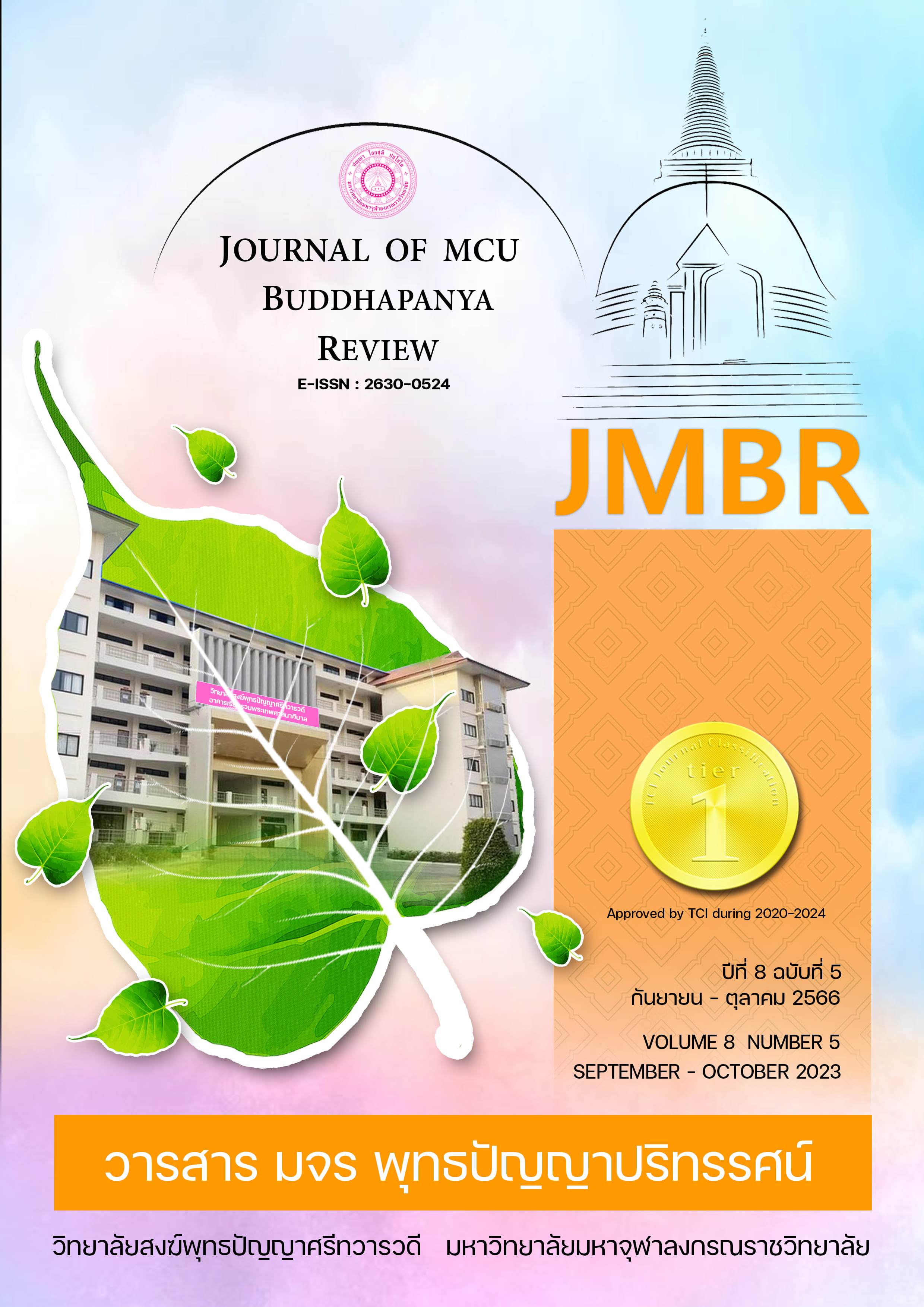นโยบายการพัฒนาการเรียนระบบออนไลน์เพื่อลดความเหลื่อมล้ำ
คำสำคัญ:
นโยบาย, การเรียนระบบออนไลน์, ความเหลื่อมล้ำบทคัดย่อ
การวิจัยนี้มีวัตถุประสงค์เพื่อ 1) ศึกษานโยบายการพัฒนาการเรียนระบบออนไลน์เพื่อลดความเหลื่อมล้ำ จากอดีตถึงปัจจุบัน 2) ศึกษาองค์ประกอบที่ส่งผลต่อนโยบายการพัฒนาการเรียนระบบออนไลน์เพื่อลดความเหลื่อมล้ำ และ 3) จัดทำข้อเสนอเชิงนโยบายในการพัฒนาการเรียนระบบออนไลน์เพื่อลดความเหลื่อมล้ำ ใช้วิธีวิจัย เชิงคุณภาพ (Qualitative Research) เป็นหลักในการศึกษาข้อมูลจากปรากฏการณ์ที่เกิดขึ้น กลุ่มผู้ให้ข้อมูลสำคัญได้แก่ 1) กลุ่มผู้บริหารหน่วยงานที่เกี่ยวข้อง 2) กลุ่มผู้มีส่วนได้ส่วนเสีย และ 3) กลุ่มผู้เชี่ยวชาญ รวบรวมข้อมูลจากเอกสารงานวิจัยที่เกี่ยวข้องโดยการสัมภาษณ์เชิงลึกและการจัดประชุมเชิงนโยบาย
ผลการวิจัยพบว่า 1) ในอดีตระบบการเรียนออนไลน์ทางไกลผ่านดาวเทียม เป็นช่องทางการเรียนการสอนเพื่อลดความเหลื่อมล้ำทางการศึกษา แต่ภายใต้สถานการณ์โรคระบาดทำให้การเรียนการสอนไม่สามารถดำเนินการได้ตามปกติ นโยบายการเรียนออนไลน์จึงเข้ามามีบทบาทสำคัญและหลากหลายช่องทางเพิ่มมากขึ้นจากในอดีต 2) องค์ประกอบที่ส่งผลกระทบต่อนโยบายการพัฒนาการเรียนระบบออนไลน์เพื่อลดความเหลื่อมล้ำ พบว่า มีองค์ประกอบที่สำคัญประกอบด้วย ด้านภูมิลำเนาหรือพื้นที่ ด้านฐานะทางสังคมและเศรษฐกิจของครอบครัว ด้านสภาวะและวัฒนธรรมในครอบครัว และด้านความแตกต่างทางเทคโนโลยี และ 3) ข้อเสนอเชิงนโยบายในการพัฒนาการเรียนออนไลน์เพื่อลดความเหลื่อมล้ำ ดังนี้ 1) ด้านแนวทางการจัดการศึกษาในสถานการณ์โรคระบาด ควรใช้วิธีผสมผสานรูปแบบการเรียนรู้ที่หลากหลาย 2) ด้านมาตรการและแนวทางการดำเนินงานของกระทรวงศึกษาธิการในด้านนโยบายต้องกำหนดวัตถุประสงค์ให้ชัดเจนบนพื้นฐานของข้อมูลที่แท้จริง และบูรณาการในการดำเนินงาน 3) ด้านการจัดการเรียนการสอนผ่านเครือข่ายและระบบเทคโนโลยีสารสนเทศแบบต่าง ๆ ครบปรับกระบวนการเรียนการสอนที่เหมาะสม สร้างความร่วมมือระหว่างภาครัฐ เอกชน และประชาชน โดยเฉพาะผู้ปกครอง และ 4) ด้านการบริหารและจัดการการเรียนออนไลน์เพื่อลดความเหลื่อมล้ำโดยการจัดการศึกษาเชิงพื้นที่เป็นสำคัญ
เอกสารอ้างอิง
Kokkanplu, A. (2020). “Factors influencing social inequality in the area. Community-Based Tourism, Thailand.” Humanities. 21(3), 215-236.
Dokthaisong, B. (2010). Scope of Public Administration in the Globalization Era. Bangkok: Intellectuals.
Considine, M. (2005). Making public policy: Institutions, actors, strategies. Cambridge, MA: Policy Press.
Easton, D. (1953). The Political System: An Inquiry into the State of Political Science. New York: Alfred A. Knopf.
Cuesta, J. (2013). Social Spending, Distribution, and Equality of Opportunities: The Opportunity Incidence Analysis. World Bank.
Champanil, K. (2020). “Guidelines for creating digital citizenship of secondary school students.” Educational Administration Journal. Khon Kaen University. 16(1), 116-127.
Phothiram, O. (4 November 2020). Online learning. (Winit Phacharoen, interviewer)
Pathom Intharoek M. (2019). Please Mind The Digital Gap…Thai digital population in the marginalized. Retrieved November 17, 2021, from https://brandinside.asia/
Worapatthirakul, P. (2017). Management of the Thai Government under the Welfare State System. Journal of Management Science Nakhon Pathom Rajabhat University. 4(1), 110-122.
Silasaro, K. (Run Samran). (2017). “A Analysis of Policies and Strategies for Sustainable Reduction of Inequality in Thai Society. Rattanabut Academic Journal (RATANABUTH JOURNAL). 3(2), 63-68.
Pholpirun, P. (2020). Study "online" with school closures and openings during COVID-19. Retrieved September 24, 2021 from: https://www.posttoday.com/finance-stock/columnist/621935
Lammana, P. (2020). “Duties of the State in Education Management: Strengthening Students' Readiness for Online Learning.” Social Science Journal Law of Political Science. 4(2), 150-175.
Vanichanan, P. (2020). Basic education in the Covid-19 era: how to open and close schools?. Retrieved April 18, 2022, from https://tdri.or.th/2020/05/basic-education-in-covid-19-crisis-reopening-school-after-lockdown/
Post Today. (2021). Overlap...online learning 4.0 rural children drop out of the education system. Retrieved on September 22, 2021 from https://www.posttoday.com/
Saengmahamad, R. (2020). Assessment of the democratic situation of Thailand: Catching the Pulse of Thai Democracy B.E. 2020. Retrieved March 16, 2022,
from https://www.kpi.ac.th/knowledge/book/data/1198page=11
Wehachat, R. (2021). “Distance Education Management via Satellite (DLTV) in the COVID-19 Era.” Journal of the Professional Development Association of Education Administration of Thailand. 3(1), 29-47.
Kanaphum, S. and Chandaeng, B. (2019). “Public Policy Leadership Theory Model. into action.” Journal of Local Government Administration and Innovation. 3(1), 95-115.
Sharkansky, I. (1970). Policy Analysis in Political Science. Chicago: Markham.
Inthasonthi, S. (2020). Covid-19: and online teaching, case studies, academic writing. Web Programs (COVID - 19 and Online Teaching case study: Web Programming Course), Journal of Management Science Review. 22(2), 203-213.
Suksom, S. (2018). Water traffic in Bangkok. Institute of academic journals Technology of Suvarnabhumi. 4(1), 88-99.
Thairath online. (2021). Open the source “Kao Dong Kluay”. Kindergarten students clearly answer after the teacher asks. Do you have internet at home? Retrieved 19 November 2021, from https://www.thairath.co.th/news/society/1845036.
Thomas R. Dye. (1984). Understanding Public Policy. 3rd ed. Englewood Cliffs. New Jersey: Prentice-Hall.
Kongklum, U. (2018). Special Sa Kaeo Province." Journal of Administrative Administration. 7(1), 378-395.
Suksawat, W. (4 November 2020). Online learning. (Winit Phacharoen, interviewer).
Phacharoen, W. (2021). Educational inequality of Thai citizens of school age and the situation. Online learning in the age of COVID-19. Journal of Panya Determination. 6(1), 1-14.
Wayo, W. et al. (2020). “Online teaching and learning under the epidemic situation. of the COVID-19 virus: Concepts and applications of teaching and learning.” Journal of Ananai Center 9. 14(34), 285-298.
ดาวน์โหลด
เผยแพร่แล้ว
รูปแบบการอ้างอิง
ฉบับ
ประเภทบทความ
สัญญาอนุญาต
ลิขสิทธิ์ (c) 2023 วารสาร มจร พุทธปัญญาปริทรรศน์

อนุญาตภายใต้เงื่อนไข Creative Commons Attribution-NonCommercial-NoDerivatives 4.0 International License.



